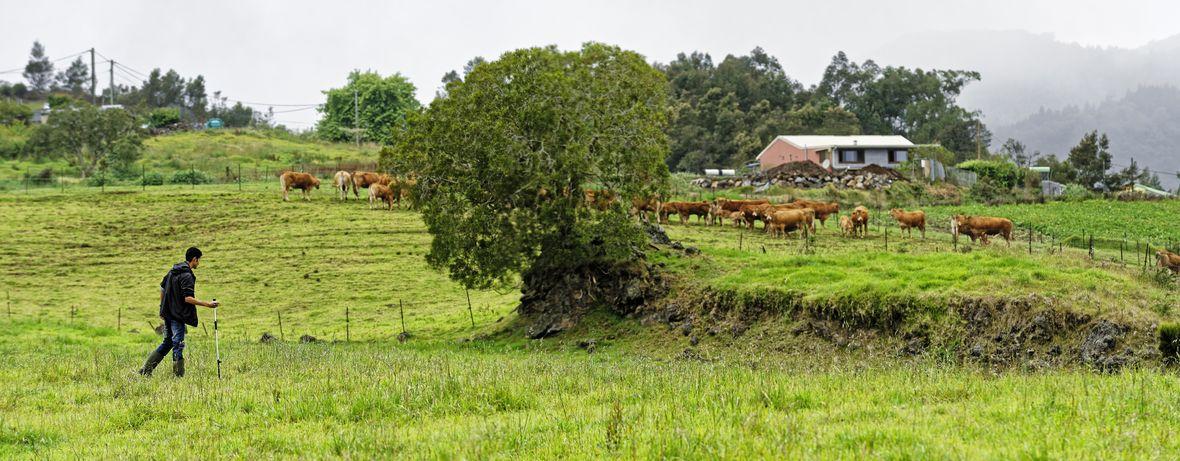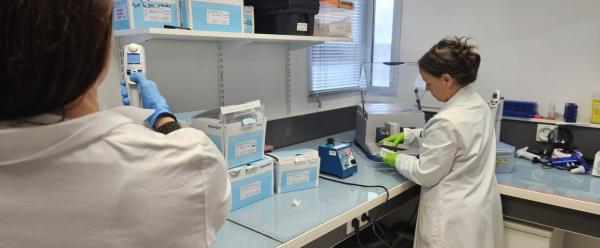Science at work 19 February 2026
- Home
- Press area
- Press releases
- One Health is central to the French Committee for the Monitoring and Anticipation of Health Risks
One Health approaches are central to the French Committee for Monitoring and Anticipation of Health Risks

The One Health concept centres on the principle that animal, plant, environmental and human health are inextricably linked © R. Carayol, CIRAD
The aim of the French government in creating the Committee for Monitoring and Anticipating Health Risks (COVARS) in 2022 was to learn from the recent Covid-19 pandemic. The committee's role is to work on the issues surrounding the anticipation and prevention of health crises, and their consequences for the population. A One Health approach is vital in this context.
The holistic One Health concept was initiated in the early 2000s and born of the increased frequency and emergence of infectious diseases at least partly caused by trade globalization and climate disruption. It centres on the principle that animal, plant, environmental and human health are inextricably linked. Protecting public health therefore means protecting that of wildlife and interactions with the environment.
The One Health approach notably takes the form of concrete research and surveillance operations on disease emergence, from prevention to management through anticipation early detection on a national, regional and international level. This way of addressing health serves to take ecosystems as a whole into account and to find solutions to both health and environmental issues.
A multidisciplinary, multi-sectoral body
For the above reasons, the One Health principle is an integral, central part of the COVARS and is reflected in its multidisciplinary, multi-sectoral composition. The committee's 16 expert members represent a wide range of specialities in the fields of human, animal and environmental health.
Epidemiologists, virologists, infectious disease specialists, general practitioners, emergency doctors, immunologists and vaccinologists, entomologists, modelling specialists, veterinary epidemiologists and microbiologists, ecologists, sociologists, population scientists, health policy specialists and so on all contribute to the whole, working together to build an overall view of the risks.
Three civil society representatives (patient associations and representatives of the general public) supplement that scientific expertise with their experience and knowledge of health democracy, community health, and grassroots management of emerging diseases. Their involvement is particularly valuable in that they can back up the committee's recommendations with their practical experience, to guarantee their acceptability to civil society and their long-term relevance.
In response to requests from the French government or to priority health risks, the COVARS consults a range of stakeholders in various sectors. With them, it works to build a broad, comprehensive vision of each topic, in line with the new, inclusive definition One Health.
Ten reports or recommendations published
To date, the COVARS has published ten reports or recommendations, including seven in direct response to requests from the government (Covid-19, monkeypox and mRNA vaccines), and others on topics that its members see as a priority, notably vector-borne diseases and highly pathogenic avian influenza (HPAI), to which One Health is particularly relevant. The One Health component is systematically covered in holistic analyses of the risks and in the committee's recommendations, irrespective of the topic at hand.
An independent, transparent body that is not alone
The COVARS is an independent, transparent body attached to the Ministry of Higher Education and Research and the Ministry of Health and Prevention, and works closely with other ministries (agriculture, ecological transition, foreign affairs and the interior), which are all vital to an overall, inter-ministerial One Health approach. The committee thus operates at the interface between science and policymaking, and is helping to expand and improve understanding, adoption and implementation of the One Health approach in France.
The COVARS is obviously not alone in its approach. Ministries, research organizations, health agencies, civil society and regional government are playing a key role in backing the One Health approach. They are all part of a common federation that is crucial for consolidating and improving understanding and implementation of the One Health approaches. On the whole, however, national efforts in favour of implementing One Health approaches remain sketchy, and there is still a good deal to do to ensure effective, transparent interactions on One Health issues.
An example for other countries?
This complex topic, which encompasses issues surrounding prevention and emergency preparedness, must be analysed on every scale, from local to international. The COVARS could therefore set an example for other governments hoping to build One Health scientific advice services. This would strengthen regional One Health networks, by involving countries with the same epidemiological characteristics and emerging risks, irrespective of their resources.
A true paradigm shift
In 2022, the French Scientific Council on Covid-19 expressed its concern about the fact that the One Health strategy was not widely shared in cultural terms, and was poorly structured and insufficiently operational or legible. It is no longer enough simply to issue reminders of the urgent need to switch from a one-sided vision of health to an integrated, broader, holistic one. This type of paradigm shift is now taking shape and is reflected within the COVARS itself, through its composition, recommendations and scope. It will facilitate efforts to address health crises related to climate change and biodiversity loss.
The COVARS is...
- a Committee for Monitoring and Anticipating Health Risks founded by the French government on 31 July 2022 to advise the Ministers of Health and of Research;
- a multi-disciplinary, multi-sectoral body of committee16 experts from the human, animal and environmental health sectors plus three health democracy representatives;
- a wide-ranging remit covering health risks encompassing the One Health component, which is systematically applied in holistic risk analyses and in the recommendations made subsequently;
- a committee at the interface between science and policymaking, promoting One Health approaches and working to enrich and boost understanding and implementation of the One Health approach in France;
- a champion of rolling out the One Health principle on a national and international level, to facilitate worldwide health risk surveillance.
Reference
Lefrançois, T., Lina, B., COVARS. et al. One Health approach at the heart of the French Committee for monitoring and anticipating health risks. Nature Communications 14, 7540 (2023).



























